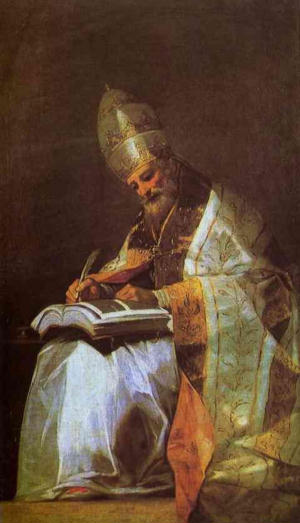
Life (400?-461)
The designation “great”, applied to a ruler, is very rare. A ruler does not assume that title himself (or herself); it is bestowed by posterity on those who have discharged their tasks with extraordinary ability. History has attached the adjective to only three popes. The first of them was St. Leo I, Father and Doctor of the Church.
Leo’s early background is obscure. When we first encounter him as a cleric of the papal court in the early fifth century, he is already an influential theologian, administrator and diplomat. In the year 440 Leo was sent to Gaul by Pope Sixtus III to reconcile two Roman generals. While he was on this mission Sixtus died, and Leo was elected to succeed him.
It soon became clear that Pope Leo was a man of principle and a man of decision. Italy looked to him as its special protector. In those days Europe was being overrun by barbarian tribes, and the Roman imperial officials were unable to offer strong military resistance. Thus Attila and his Huns swept through northern Italy in 452, and having laid waste to Milan and Pavia, turned towards Rome. Emperor Valentinian III and the Roman Senate commissioned the pope as the man best fitted to negotiate with this enemy before he reached the Capital. Leo did so, and was able to deter Attila from attacking Rome by an agreement to pay him a yearly sum of tribute.
Pope Leo was not so successful in 455 when Gaiseric, leader of the barbarian Vandals, turned up at the gates of Rome eager for booty. The pope was able, however, to persuade Gaiseric to be content with pillaging the city, without slaying its citizens or burning its buildings. Leo followed through, nonetheless. He quickly sent priests to Africa to minister to the many Christian prisoners that the Vandals had captured, and he began at once to replace the sacred vessels and ornaments that the invaders had stolen from Rome’s churches.
In dealing with church administration, Pope Leo was firm and decisive: he had the duty to supervise all the churches, East and West. (In fact, it was Leo the Great who first developed clearly the theology of the primacy that the bishops of Rome exercise throughout Christianity.)
What Leo became most famous for was his response to the current heresies concerning the Incarnation. In his day the Eastern heretic Nestorius defended the error that Christ, in the Incarnation, was actually two persons - one human, one divine. Nestorius’ opponent Eutyches argued just the opposite error; he claimed that after the Incarnation Christ was not only one person, but had only one nature. Both of these errors implied that Jesus was not the God man. If this were true, His death on the cross as man, offered up by Him as God, could not have won our redemption. Leo responded with beautiful clarity, that Christ is one person with two natures, that of God and that of man. Not only was He “one in substance” with the Father as God, but also “one in substance” with the human race through His Mother Mary.
When the ecumenical council of Chalcedon met to reject these errors in A.D. 451, they adopted Pope Leo’s dogmatic letter declaring Christ to be both true God and true man. In fact, the Fathers of the council hailed the pope’s clarification, crying out, “Peter has spoken by Leo!” If this energetic pope won the admiration of all, it was because of his serene faith that the Holy Spirit would never fail the Church, Christ’s body. A point that St. Leo always emphasized in his beautiful sermons was that every Christian has been joined by baptism to Christ, the head of His body, the Church, and by that fact has been made a sharer in His divinity. “O Christian,” the pope cried out, “acknowledge your worth! Recall that you have been rescued from the power of darkness and have been transferred into the light and kingdom of God.” Sublime words from this holy and wise successor of the prince of the apostles! --Father Robert F. McNamara
Scripture (Sirach 39:6-11)
Tu es Petrus,
et super hanc petram aedificabo ecclesiam meam
et portae inferi non praevalebunt adversus eam.
Et tibi dabo claves regni caelorum.
Quodcumque ligaveris super terram, erit ligatum et in caelis,
et quodcumque solveris super terram, erit solutum et in caelis.
Et tibi dabo claves regni caelorum.
You are Peter,
And upon this Rock I will build My Church:
and the gates of hell shall not overcome it.
And I will give you the keys to the kingdom of heaven.
Whatever you bind upon earth shall be bound in heaven,
and whatever you release upon earth shall be released in heaven,
and I will give you the keys to the kingdom of Heaven.
Collect
who made your servant Leo strong in the defence of the faith:
fill your Church with the spirit of truth that,
guided by humility and governed by love,
she may prevail against the powers of evil;
through Jesus Christ your Son our Lord,
who lives and reigns with you,
in the unity of the Holy Spirit,
God, now and for ever. Amen. (English Missal)